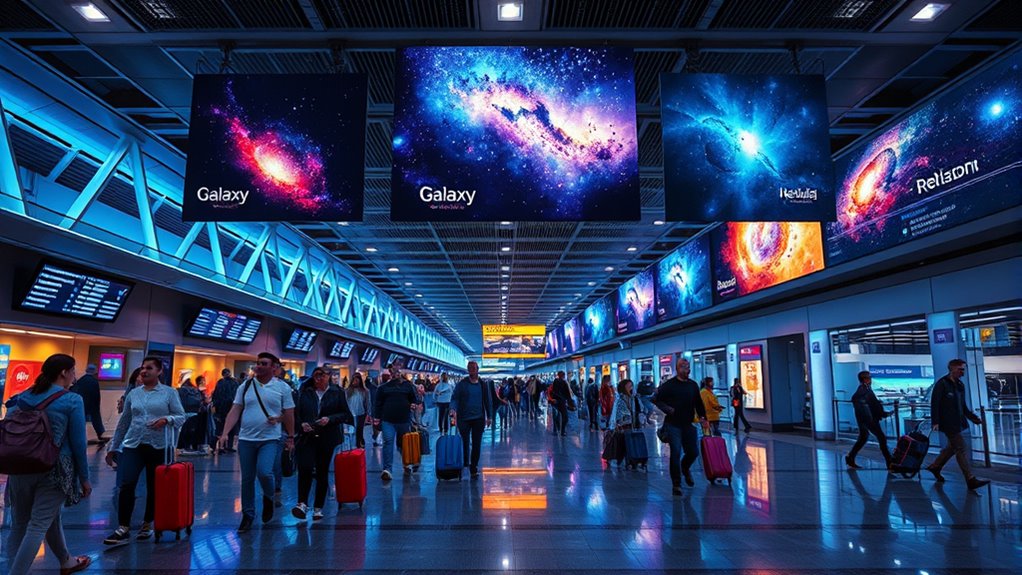During Galaxy Season, you face hidden costs like higher maintenance, specialized gear, increased travel expenses, and seasonal permits, which can strain your budget. Weather surprises and safety upgrades also add unexpected expenses, while overlooking off-peak discounts results in missed savings. To avoid these pitfalls, plan ahead, prioritize safety, and search for cost-effective options. Knowing how to manage these hidden factors helps keep your expenses in check—if you continue, you’ll discover how to stay on top of these challenges.
Key Takeaways
- Galaxy Season incurs higher operational costs due to increased staffing, maintenance, and emergency preparedness, which can be mitigated with proactive planning.
- Permits and specialized equipment costs spike during Galaxy Season; early research and rental options help control expenses.
- Travel and accommodation prices surge during Galaxy Season; booking off-peak or flexible travel dates reduces overall costs.
- Safety and staff training investments are crucial during Galaxy Season to prevent costly incidents and downtime.
- Overlooking off-peak opportunities and weather impacts can lead to hidden expenses; strategic scheduling minimizes financial risks.
Unexpected Maintenance Expenses During Peak Seasons

During peak seasons like Galaxy Season and Nebula Season, maintenance costs can unexpectedly spike, catching many off guard. With the influx of seasonal staff, your team’s workload increases, often leading to overlooked vehicle maintenance. You might find yourself rushing to keep vehicles in top shape, but neglecting routine checks can lead to costly breakdowns. The added pressure of busy schedules means you’re more likely to skip essential service, risking engine issues or tire failures. These unforeseen expenses can strain your budget and disrupt operations. To avoid surprises, schedule regular vehicle maintenance ahead of peak seasons and ensure seasonal staff understand the importance of upkeep. Staying proactive helps keep your fleet running smoothly and minimizes the financial shock of sudden repairs. Proper planning and awareness of maintenance benefits are key to managing costs effectively.
Special Equipment and Gear Requirements

As you gear up for Galaxy Season and Nebula Season, you’ll likely find that special equipment becomes a significant expense. Both seasons demand specialized gear tailored to their unique environments, which often entails high costs. Technical requirements may include advanced navigational tools, protective clothing, or specialized accessories to guarantee safety and optimal performance. These items are not always standard, forcing you to invest in specific gear that can handle extreme conditions or intricate setups. Failing to meet these technical standards can jeopardize your experience or safety. To avoid overspending, research the exact equipment needed for each season, compare prices, and consider renting or borrowing gear when possible. Being prepared with the right specialized gear minimizes unexpected expenses and ensures smoother adventures. Proper growing techniques can also help optimize seed yields and reduce the need for costly interventions.
Increased Travel and Accommodation Costs

Investing in specialized gear often means additional expenses, but the costs don’t stop there. During peak seasons like galaxy or nebula season, you’ll likely face increased travel and accommodation costs. Flights and hotels tend to surge in price as demand spikes, making it more expensive to attend events or visit observation sites. You’ll also need to contemplate transportation logistics, which become more complex with larger crowds and limited options. Don’t forget to invest in travel insurance to protect your trip against cancellations or delays caused by weather or other unforeseen issues. Planning ahead and booking early can help you avoid the highest prices. Being aware of these hidden costs allows you to budget more effectively and make smarter choices for your astronomical adventures. Additionally, best anime movies can provide entertaining distractions during downtime without additional expenses.
Seasonal Permits and Licensing Fees

You’ll need to budget for permit application costs and renewal expenses that can add up quickly. Seasonal permit restrictions might limit your activities or require additional fees if you want to expand your access. Understanding these licensing fees helps you avoid unexpected costs during peak seasons. Additionally, staying informed about vetted regulations can ensure compliance and prevent potential penalties.
Permit Application Costs
Securing the necessary permits can considerably impact your overall costs, especially since seasonal permits and licensing fees vary depending on the galaxy or nebula season you’re planning to operate in. Permit application fees are a key expense, and they differ based on location and scope of your operation. These fees are essential for ensuring regulatory compliance and gaining official approval to operate. Failing to account for these costs upfront can lead to unexpected expenses or delays. To avoid surprises, research the specific permit requirements for each season and region. Additionally, understanding the regulatory landscape can help you anticipate potential hurdles and costs. By understanding the permit application process and associated fees, you can budget accurately and streamline your approval timeline, ensuring your project stays on track without incurring unnecessary financial burdens.
Licensing Renewal Expenses
Renewing seasonal permits and licensing fees is an ongoing expense that can catch you off guard if not planned for in advance. License renewal requires timely submissions and payments to stay compliant with local regulations, avoiding fines or interruptions. These compliance costs often increase during peak seasons, as authorities may raise renewal fees or tighten requirements. Failing to renew on time can result in penalties or the need to reapply, which adds extra costs and delays. To keep expenses predictable, track renewal deadlines closely and budget for these recurring fees. Additionally, understanding payment processing solutions can help streamline the renewal payments, saving time and reducing errors. By staying proactive, you avoid unnecessary penalties and ensure your operations run smoothly without unexpected financial setbacks related to license renewal. Planning ahead keeps your seasonal activities compliant and cost-efficient.
Seasonal Permit Restrictions
Seasonal permits often come with specific restrictions that can impact your operations during peak times. These seasonal permit restrictions may limit the hours you can operate, restrict certain activities, or specify designated zones, affecting your flexibility and customer access. Additionally, permit application costs can vary, sometimes adding unexpected expenses to your budget. If you overlook these restrictions, you risk fines, delays, or even shutdowns during critical periods. To avoid surprises, review all permit conditions carefully before applying. Planning ahead allows you to allocate resources effectively and ensure compliance. Being aware of seasonal permit restrictions helps you navigate licensing requirements smoothly, avoiding costly mistakes that could disrupt your busy season and impact your bottom line. Understanding personality traits can further assist in customizing your approach to permit management and customer service.
Hidden Weather-Related Challenges and Costs

Weather conditions can quietly escalate costs during galaxy and nebula seasons, often catching you off guard. Unpredictable weather patterns, such as sudden storms or temperature swings, impact your planning and equipment. These conditions can delay launches, damage sensitive gear, or increase energy expenses for climate control. The climate impact during these seasons varies by region, making it essential to monitor forecasts closely. Ignoring subtle weather shifts can lead to costly setbacks or compromised safety. By understanding local weather trends and preparing for variability, you can avoid unanticipated expenses. Staying flexible with your schedule and investing in weather-resistant equipment helps mitigate these hidden costs. Being proactive about weather-related challenges ensures smoother operations and reduces financial surprises. Additionally, tracking visitor interactions and site metrics can help you better anticipate how weather-related disruptions might influence your planning.
Extra Safety Measures and Emergency Preparedness

You need to guarantee your emergency equipment is fully ready and accessible at all times. Proper staff safety training is essential to respond quickly and effectively during incidents. Having clear incident response plans helps your team act confidently and minimizes potential risks. Regularly reviewing your safety protocols ensures that all procedures remain effective and up-to-date.
Emergency Equipment Readiness
Ensuring emergency equipment is fully ready is essential, especially during Galaxy Season when the higher activity levels increase the risk of accidents or system failures. Regularly conducting emergency drills ensures your team knows how to respond swiftly and effectively in crises. Confirm that all safety protocols are up to date and clearly visible, so everyone understands their roles during an emergency. Check that fire extinguishers, first aid kits, and backup power supplies are accessible, functional, and properly maintained. A well-prepared environment minimizes downtime and reduces potential injuries. Keeping emergency equipment ready not only complies with safety standards but also demonstrates your commitment to staff well-being. Electric power generation equipment should also be inspected regularly to ensure reliable operation during emergencies. Proactive readiness helps you navigate Galaxy Season’s challenges without costly delays or mishaps.
Staff Safety Training
To effectively handle the increased risks during Galaxy Season, implementing thorough staff safety training is essential. You need clear training protocols that emphasize staff safety, ensuring everyone understands how to respond quickly and effectively in emergencies. Proper training helps your team recognize hazards specific to Galaxy Season, such as crowded areas or complex equipment. It also guarantees they’re familiar with safety procedures, including evacuation routes and emergency contacts. Regular drills reinforce these protocols, reducing panic and confusion during actual incidents. Investing in extensive safety training minimizes risks, protecting staff and visitors alike. Remember, well-trained staff can prevent accidents before they happen and respond confidently if an emergency occurs. Prioritizing staff safety through effective training protocols ultimately helps you avoid costly delays and liabilities.
Incident Response Plans
Building a solid incident response plan is vital for handling emergencies effectively during Galaxy Season. Your plan should clearly outline procedures for rapid response, guaranteeing staff know their roles and actions to minimize damage. Incident response plans are indispensable for risk mitigation, helping you identify potential threats early and act swiftly. Regularly review and update your plan to address new risks and guarantee everyone is prepared. Incorporate safety protocols, communication channels, and escalation procedures to streamline emergency management. By investing in thorough incident response plans, you reduce the likelihood of costly delays or mishaps during critical moments. Proper planning not only protects your team and assets but also safeguards your reputation, keeping your operations smooth and resilient amidst the chaos of Galaxy Season.
Overlooking Off-Peak Discounts and Savings Opportunities

Many travelers overlook the significant savings available during off-peak seasons, missing out on discounts that can substantially reduce costs. Off peak discounts are often overlooked because travelers assume peak times offer the best experiences or prices, but they tend to ignore the savings opportunities during quieter periods. By planning your trip during these times, you can enjoy lower prices on accommodations, transportation, and activities. Not taking advantage of off-peak discounts means paying more than necessary, which can add up quickly. To avoid this hidden cost, research the shoulder seasons or off-peak periods for your destination. Being flexible with your travel dates allows you to maximize savings opportunities, making your trip more affordable without sacrificing quality or experience.
Frequently Asked Questions
How Do Seasonal Demand Fluctuations Impact Overall Project Budgets?
Seasonal demand fluctuations can notably impact your project budgets by causing unexpected costs. You need to optimize inventory management to avoid overstocking or shortages, which can increase expenses. Additionally, plan staffing adjustments carefully—hiring extra staff during peak times and reducing it afterward helps control labor costs. Being proactive in managing these factors ensures your budget stays on track despite seasonal changes, saving you money and reducing surprises.
What Are the Long-Term Financial Risks of Ignoring Seasonal Cost Variations?
Ignoring seasonal cost variations risks destabilizing your long-term finances. You might face seasonal cash flow shortages, making it hard to cover expenses during peak times. Cost inflation can escalate expenses unexpectedly if you don’t plan for seasonal fluctuations, reducing profit margins. Over time, these overlooked risks can lead to increased debt or reduced investment capacity, ultimately threatening your business’s sustainability. Stay proactive by monitoring seasonal trends and adjusting budgets accordingly.
Are There Specific Industries More Affected by Seasonal Hidden Costs?
Yes, some industries face more impact from seasonal hidden costs. For example, retail, hospitality, and agriculture encounter industry specific challenges like inventory surges or labor shortages during peak times. To manage these, you need effective seasonal financial planning, which helps you anticipate costs and avoid unexpected expenses. By understanding these patterns, you can allocate resources wisely, reduce financial surprises, and maintain stability throughout the year.
How Can Businesses Better Forecast Unforeseen Seasonal Expenses?
Picture your business as a ship steering unpredictable seas—seasonal forecasting becomes your compass. To better forecast unforeseen seasonal expenses, you must analyze past data, monitor industry trends, and implement flexible expense management strategies. Staying alert to shifting patterns helps you anticipate hidden costs before they hit, keeping your operations steady and your budget intact. Active forecasting turns the stormy seas into navigable waters, ensuring smoother sailing year-round.
What Strategies Can Minimize Seasonal Cost Spikes Without Compromising Quality?
You can minimize seasonal cost spikes by optimizing inventory management to prevent overstocking or shortages. Additionally, negotiate flexible terms with suppliers to adapt quickly to demand fluctuations. Implementing just-in-time inventory practices and maintaining strong supplier relationships help you control costs without sacrificing quality. Regularly reviewing your inventory and supplier agreements ensures you’re prepared for seasonal shifts, keeping expenses predictable and maintaining high standards.
Conclusion
So, next time you plunge into galaxy or nebula season, remember—those hidden costs aren’t just cosmic jokes. Expect surprise maintenance, pricey gear, and weather tantrums. Skip the permits, and you might find yourself orbiting in trouble. But hey, who needs savings when you can chase stars and pay the price? Prepare wisely, or you’ll be the universe’s favorite cautionary tale. After all, stargazing shouldn’t come with a bill from the celestial billing department!









